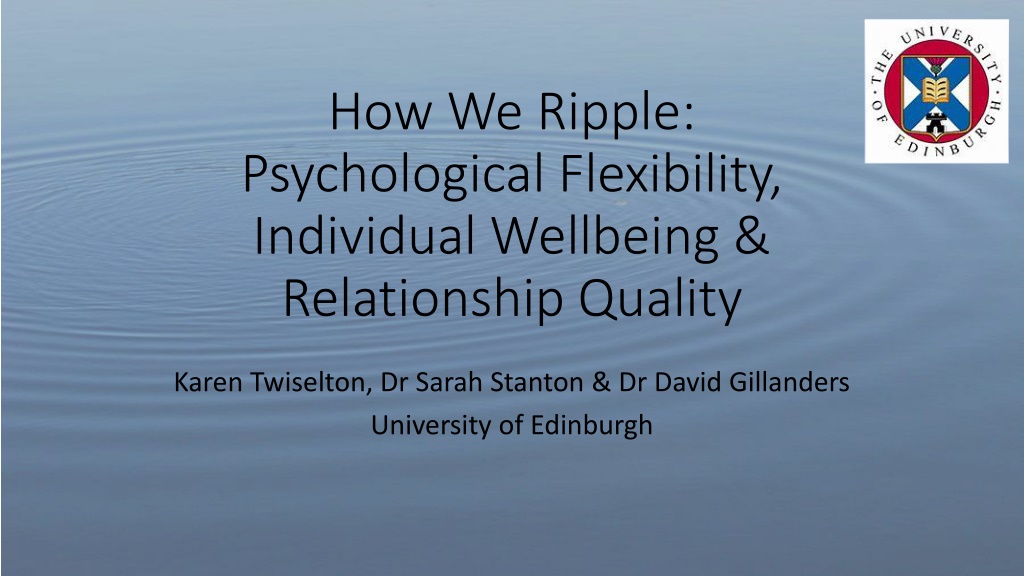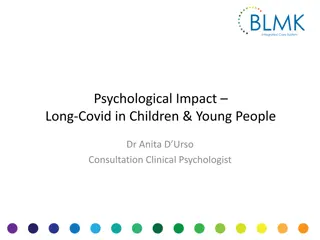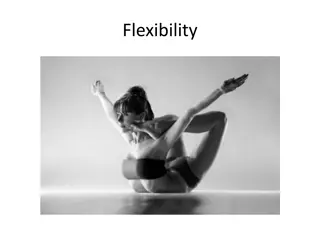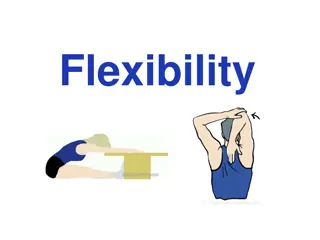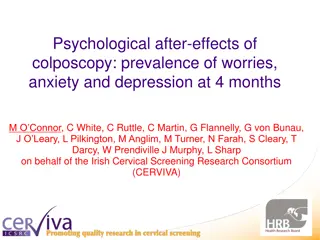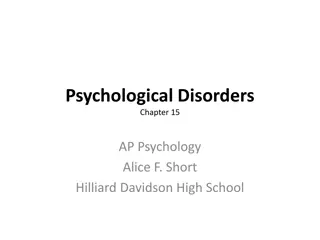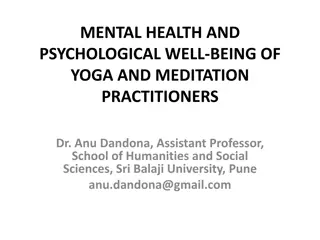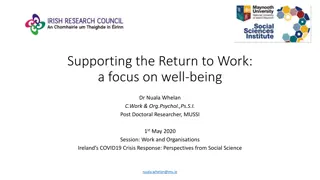Psychological Flexibility and Relationship Quality Study
This study explores the relationship between psychological flexibility, individual wellbeing, and relationship quality. It reveals correlations between psychological flexibility, positive affect, negative affect, satisfaction with life, psychological wellbeing, and relationship quality in romantic relationships. Factors such as life satisfaction, relationship quality, positive affect, valued action, and behavioral awareness are examined for their impact on individual and relational levels of wellbeing.
Download Presentation

Please find below an Image/Link to download the presentation.
The content on the website is provided AS IS for your information and personal use only. It may not be sold, licensed, or shared on other websites without obtaining consent from the author.If you encounter any issues during the download, it is possible that the publisher has removed the file from their server.
You are allowed to download the files provided on this website for personal or commercial use, subject to the condition that they are used lawfully. All files are the property of their respective owners.
The content on the website is provided AS IS for your information and personal use only. It may not be sold, licensed, or shared on other websites without obtaining consent from the author.
E N D
Presentation Transcript
How We Ripple: Psychological Flexibility, Individual Wellbeing & Relationship Quality Karen Twiselton, Dr Sarah Stanton & Dr David Gillanders University of Edinburgh
Wellbeing and Relationship Quality Social relationships often viewed as single biggest predictor of subjective wellbeing (Argyle, 2001; Vohs & Finkel, 2006) Positive relationships linked to lower susceptibility to ailments and to higher quality of life (Uchino, 2006; Chu, Saucier & Hafner, 2010) Social integration linked to longevity (House, Landis & Umberson, 1988; Lunstad-Holt, Smith & Layton, 2010) and people with a happy spouse live longer (Stavrova, 2019) Interdependent couple relationships exert their influence at cognitive, affective and behavioural levels (Kelly & Thibaut, 1978) What role does psychological flexibility play in this context?
Defining our Constructs Relationship Quality Subjective Wellbeing Psychological Flexibility Psychological Wellbeing Closeness Autonomy Openness to experience Positive affect Environmental mastery Commitment Negative affect Behavioural awareness Love Personal growth Passion Valued action Satisfaction with life Positive relations with others Satisfaction Purpose in life Trust Self-acceptance PANAS (Watson et al., 1988) SWLS (Diener et al., 1985) CompACT (Francis et al., 2016) PRQC (Fletcher et al., 2000) PWBS (Ryff, 1989)
Individual level study Aim: To explore how measures were related Participants Relationship length: 1 month 54 years (Myears = 9) 1176 people in a romantic relationship 82% Cohabiting Gender: 678 female, 495 male, 2 genderqueer, 1 unreported 78% Caucasian Age: 18-76 (Myears = 36)
Correlations between study variables PF PA NA SWL PW RQ Psychological Flexibility (PF) - .33** -.54** .40** .80** .36** Positive Affect (PA) - -.13** .51** .48** .36** Negative Affect (NA) - -.31** -.55** -.26** Satisfaction with Life (SWL) - .61** .46** Psychological Wellbeing (PW) - .47** Relationship Quality (RQ) - ** p<.001
Factor Analysis Factor 1 Factor 2 Factor 3 Factor 4 Factor 5 Factor 6 Life Satisfaction Relationship Quality Positive Affect Valued Action Behavioural Negative Affect Awareness/ Openness to Experience IWM: .62 IWM: .59 IWM: .74 IWM: .72 IWM: .68 IWM: .75 Psychological Wellbeing Psychological Wellbeing Psychological Wellbeing IWM: .41 IWM: .36 IWM: .40 IWM = Item weighting mean
Structural Relationships Model Predictor Mediator(s) Outcome(s) 2(df), p CFI RMSEA 1 PF PA, NA RQ 3.71(1), p=.054 >.99 .05 2 RQ PA, NA PF 2.23(1), p=.135 >.99 .03 3 PF RQ PA, NA 395.06(3), p<.001 .50 .33 4 RQ PF PA, NA 100.50(3), p<.001 .88 .17 5 PF LS RQ 58.80(1), p<.001 .30 .22 6 PF RQ LS 97.26(1), p<.001 .82 .29 7 RQ PF LS 165.68(1), p<.001 .69 .37 8 RQ LS PF 58.80(1), p<.001 .89 .22 9 PF PA, NA, LS RQ 316.83(4), p<.001 .77 .26 10 RQ PA, NA, LS PF 322.68(4), p<.001 .78 .26 11 PF RQ PA, NA, LS 703.83(6), p<.001 .49 .32 12 RQ PF PA, NA, LS 477.68(6), p<.001 .65 .26
Dyadic Study Aim: To replicate our findings at the couple level, exploring cross- partner effects using APIMeM in MPLUS Participants Sample size: 212 couples 93% Cohabiting Aged 18-83 (Myears = 45) 75% Caucasian Relationship length 1 65 years (Myears = 15) 244 female, 170 male, 6 genderqueer, 4 unreported
Correlations between study variables PF-A PF-P .63** PA-A .22** PA-P .14** NA-A -.54** NA-P -.44** RQ-A .12** RQ-P .11* Psychological Flexibility- Actor (PF-A) Psychological Flexibility- Partner (PF-P) Positive Affect-Actor (PA-A) Positive Affect-Partner (PA-P) Negative Affect-Actor (NA-A) Negative Affect-Partner (NA-P) Relationship Quality-Actor (RQ-A) Relationship Quality-Partner (RQ-P) - - .14** .22** -.44** -.54** .11* .12** - .71** - -.14** -.07 - -.07 -.14** .82** - .41** .38** -.16** -.12* .38** .41** -.12* -.16** - .84** - *p < .05, **p < .01
Discussion Wellbeing has distinct facets: psychological flexibility offers a discrete contribution to the understanding of wellbeing in our data Affect has an important role in mediating the relationship between psychological flexibility and relationship quality Cross-partner associations differ for positive and negative affect
Being psychologically flexible may mean that people are more present in their relationships, and more aware of and committed to their relationship goals. This may make them happier. Thehigher sociability linked to positive affect may support enhanced communication about own and partner expectations, goals, needs and desires affording an opportunity for people to behave more effectively in their relationship.
At low psychological flexibility, being less present in their relationship and more closed to experience may contribute to a diminished sense of wellbeing associated with negative affect. Partners may find this difficult to be around and experience higher negative affect themselves. High negative affect may lead to people to effectively shut down and become less able to appreciate their relationship.
Limitations and Future Directions Data is cross-sectional: we re unable to draw causal conclusions about how psychological flexibility, affect and relationship quality are linked. Over time studies would help to establish causality. Sample characteristics reinforce need for replication. These studies focus on perceptions of relationship quality and we need to explore the behaviours that reflect relationship quality and how these vary based on actor and partner psychological flexibility.
Further details available at: Twiselton, K., Stanton, S.C.E., Gillanders, D. & Bottomley, E. (in press) Exploring the links between psychological flexibility, individual wellbeing and relationship quality. Personal Relationships https://osf.io/5tsh2/ Karen.Twiselton@ed.ac.uk Thank you!
